Reviews
Richard Fleischer
USA, 1974
Credits
Review by Cullen Gallagher
Posted on 03 November 2011
Source MGM DVD
Categories BRONSON!
“I’ve been to LA, and I’ve been to Mexico, and I’ve been laid,” says melon cropper Vince Majestyk. “Well, what do you want?” asks hitman Frank Renda. “I want to get a melon crop in,” replies Majestyk. The answer is as direct, forthright, and unambiguous as the man himself.
Mr. Majestyk was released in July 1974, just weeks before Charles Bronson’s most iconic film, Death Wish. This was arguably the pinnacle of the actor’s career. His years as an anonymous background “heavy” for Hollywood were behind him, as was his tenure in the gritty European crime and western pictures that made him a star overseas but never did much for him stateside. Now he was back in the US, commanding larger salaries and stronger scripts, creating a precarious balance between artistic integrity and commercial success. For the moment, in 1974, Bronson was at the top of his game, and Mr. Majestyk is undoubtedly one of the star’s finest films. Veteran director Richard Fleischer (The Narrow Margin, 10 Rillington Place, 20,000 Leagues Under the Sea) was at the helm. Elmore Leonard, who was one of the leading Western and Crime scribes of the time (and still is today), wrote the original screenplay for Clint Eastwood as a follow-up to their collaboration Joe Kidd. But as Eastwood was busy with High Plains Drifter, the script fell into Bronson’s hands, which provided the actor with one of his most serious—and seriously ass-kicking—films.
Vince Majestyk is the owner of Majestyk Melon Farms. It is harvest time, and he needs workers to pick the crop before it spoils. After hiring his own crew, Majestyk arrives at his farm to find a crew he didn’t hire already at work. Corrupt labor contractor Bobby Kopas is behind this. After kicking Kopas and his men off of the farm, Majestyk is falsely accused of assault and arrested. Hitman Frank Renda is also in jail at the same time and also awaiting trial. On their way to court, however, Renda’s cohorts attempt to hijack the bus of prisoners. Seeing his chance, Majestyk steals the bus and kidnaps Renda in hopes of making a deal with the local police for his own release, so he can get back to his melons. He underestimates Renda, however, and soon Majestyk finds himself wanted not only by the hitman, but also by Kopas and the cops. Majestyk will have to do a lot of running, dodging, and fighting if he is going to get his melons to market before the season is over.
Mr. Majestyk is notable for a number of reasons, one of which is its story. Using the corrupt melon industry as a plot impetus was an inspired and original touch on the part of Elmore Leonard. There’s nothing about the story that is beyond the bounds of believability—even when the guns are drawn and the car chases begin, there’s a delicate balance between the fantastic and the plausible. There is a restraint in Mr. Majestyk that isn’t always present in Bronson’s later movies, and it is this modest approach to action that gives the movie its board appeal.
The film’s attitude towards labor is worth discussing. To be clear, this is an action film, not a political diatribe. I can’t imagine anyone watching the movie and deciding that, because of party affiliation, they don’t side with Majestyk. So, to an extent, it is a very neutral and impartial story. But that isn’t to suggest that it isn’t complex and nuanced in its own way. This isn’t a clear-cut war between the workers and the landowners, and Majestyk finds himself caught between the two worlds. A former worker himself, his sympathies lie with those in the fields. He’s a professional, pays decent wages, and doesn’t tolerate racism. When the local gas station refuses to allow Hispanic workers access to the public restrooms, Majestyk intervenes on their behalf. Also, when he discovers that one of his workers, Nancy Chavez, is also a union organizer, he doesn’t feel threatened or outraged. (In fact, he’s downright turned on by Nancy’s forthright nature and aggressiveness, and she becomes his love interest, helps run his farm, and even helps to fight the mob—a killer combo that is the key to Bronson’s heart). The clear enemy in the movie is the mob, whose overt racism, exploitative practices, and corruption is plain to see. As for hitman Frank Renda—he’s just a pompous jerk (wonderfully portrayed by Al Lettieri) who is fun to see blown away by Bronson.
Majestyk can also be seen as a counter-cultural antihero who stands up against prevailing powers of the day. A veteran of the Vietnam War, he’s left the military behind and retreated to rural society and an agrarian lifestyle, perhaps a sign that he’s fed up with the modern world. Throughout the movie, he’s nothing but indignant to the cops and openly mocks their laws and concepts of justice. Lest he start to sound too radical, when he stands up to Kopas and his crew, Majestyk blasts an amplifier that was blasting Rock ‘N’ Roll. Aligned with neither the right nor the left, Majestyk is his own man, an independent who wants nothing more than to work his own land and live his own life.
The main attraction to Mr. Majestyk, however, is its star. As Vince Majestyk, Charles Bronson is the preeminent embodiment of the working man’s action hero. His physique is built from hard labor, not steroids and gymnasiums. His skin is tanned from years of sweating under the hot sun, and his face is lined like the furrows in so many fields he once plowed. His finesse with a shotgun belies his past as a Vietnam veteran, but it is nothing that a skilled hunter couldn’t emulate; even Majestyk’s gun skills are within the bounds of the common man. Majestyk trusts hands, not mouths; action, not words. His philosophy, implicit in his movement, is plain to see from the first moment we meet him as he is exiting from a gas station bathroom. Dressed head-to-toe in denim, there is little to distinguish him from the horde of laborers lining up to work on his melon farm. Majestyk’s worldview is entirely based around the notion of work. His vengeance is triggered only when his farm, his workers, or his own capacity to work is threatened. Retribution and violence is not a continually flowing river for Majestyk, but a means to an end—a means to get back to work. As he shouts during the climactic shootout, shotgun clenched firmly in hand, “Come on, Frank, let’s finish it. I got work to do!”
Work, indeed. Vince Majestyk. Sticking up for workers’ rights, fighting corruption, and taking down the mob, all so he can get back to the farm and do an honest day’s work. His motivations are simple, his actions understandable. He’s honest and incorruptible, driven and implacable. There’s a charming naivé to the whole thing, something almost Capra-esque, but it is those qualities that make Majestyk—and Bronson, in general—such a likable and relatable action hero.
More BRONSON!
-
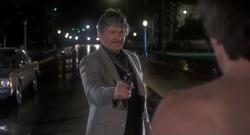
10 to Midnight
1983 -
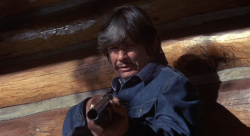
Mr. Majestyk
1974 -
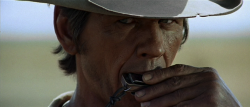
Once Upon a Time in the West
1968 -
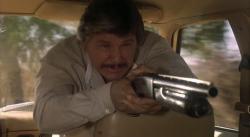
The Evil That Men Do
1984 -

Farewell, Friend
1968 -
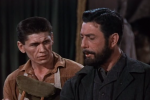
House of Wax
1953
We don’t do comments anymore, but you may contact us here or find us on Twitter or Facebook.



